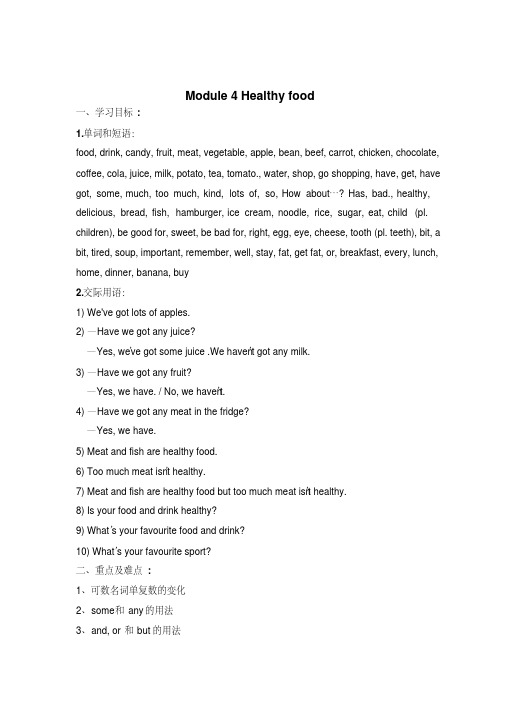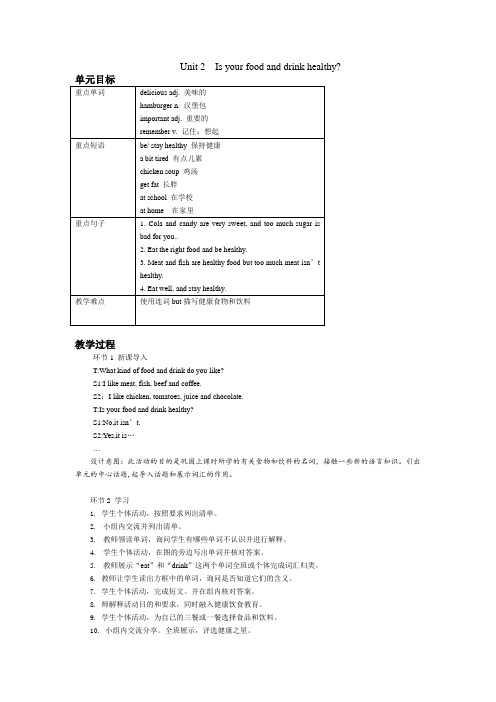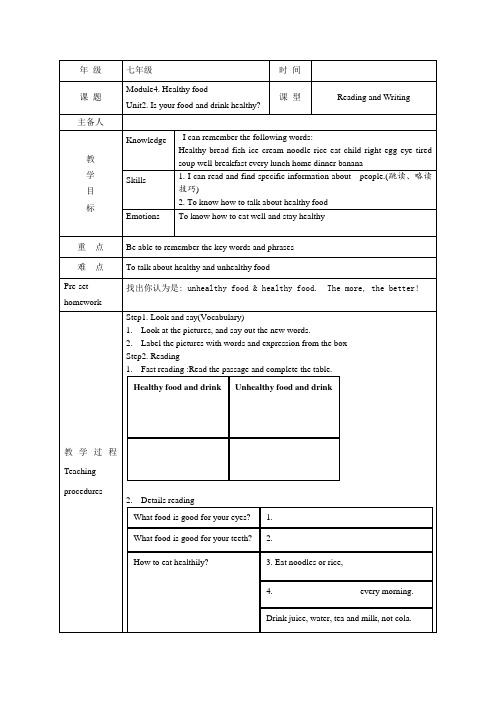初中英语七年级上册Module 7 Unit 2 Is your food and drink healthy课件
- 格式:ppt
- 大小:3.14 MB
- 文档页数:29

外研版七年级上册英语《Unit 2 Is your food and drink healthy?》教案教材分析:本节课是外研版七年级上册Module 4的第二单元,主要围绕"Is your food and drink healthy?"这个话题展开。
教材内容包括一篇关于健康饮食的短文以及相关的阅读理解任务。
在本单元中,学生将学习如何描述食物和饮料的健康程度,并学习一些关于健康饮食的重要原则。
教学目标:1. 语言目标:-学会使用句型"A bit tired?","Have lots of delicious chicken soup!"和"It is important to remember: eat well, stay healthy, and don't get fat!"进行日常交流。
-掌握祈使句和"It is...to do sth."句型的用法。
2. 情感目标:-培养学生对健康饮食的意识和重视。
-培养学生良好的饮食习惯和生活习惯。
教学重点:1. 祈使句的用法。
2. "It is...to do sth."句型的用法。
教学难点:1. 祈使句的用法。
2. "It is...to do sth."句型的用法。
学情分析:学生是七年级的初学者,英语基础较薄弱。
他们对于祈使句和"It is...to do sth."句型的使用可能存在困难。
此外,学生对于健康饮食的认识可能相对较浅,需要通过教师的引导和示范来培养正确的饮食观念。
教学过程:Step 1: 导入教师:Good morning, everyone! How are you today?学生:Good morning, teacher! We are fine, thank you.教师:Today, let's talk about healthy food and drinks. Look at these two things. (教师拿出一杯可乐和一碗蔬菜沙拉的图片或实物) Can you tell me if they are healthy or unhealthy? Is drinking cola healthy or unhealthy? Is eating vegetables good for your health?学生:(回答问题) Drinking cola is unhealthy, and eating vegetables is good for our health.Step 2: 导入新课教师:That's right! Drinking too much cola is not good for our health, buteating vegetables is healthy. Do you sometimes feel tired after a long day of studying or playing?学生:Yes, sometimes we feel tired.教师:When you feel a bit tired, what can you do to feel better? Let's learn a useful expression. Repeat after me: "A bit tired?"学生:A bit tired?教师:Great! Now, imagine you are feeling tired, and your friend wants to give you some advice. What would your friend say to you?学生:Have lots of delicious chicken soup!教师:Exactly! Your friend might say, "Have lots of delicious chicken soup!" It's a comforting and warm food that can make you feel better. Now, let's practice saying this sentence together. Repeat after me: "Have lots of delicious chicken soup!"学生:Have lots of delicious chicken soup!教师:Well done! Now let's move on to another important phrase. Look at the board. (教师将"It is important to remember: eat well, stay healthy, and don't get fat!"写在黑板上) Can you read it out loud?学生:(尝试读出句子) It is important to remember: eat well, stay healthy, and don't get fat!教师:Excellent! This sentence means that we should pay attention to our diet and make sure we eat healthy food to stay healthy. Now, let'spractice saying it together. Repeat after me: "It is important to remember: eat well, stay healthy, and don't get fat!"学生:It is important to remember: eat well, stay healthy, and don't get fat!Step 3: 学习新知教师:Now, let's focus on the grammar part. Raise your hand if you know what a command or an order is. (等待学生回答)学生:A command or an order is when someone tells you to do something.教师:That's right! In English, we use imperative sentences to give commands or orders. For example, when your mom wants you to clean your room, she might say, "Clean your room!" Let's practice making some imperative sentences. Look at the pictures on the board. (教师出示图片,例如刷牙、洗手等) What commands can you give for each picture?学生:(举手回答) Brush your teeth! Wash your hands!教师:Well done! Those are great examples of imperative sentences. Now, let's practice saying them together. Repeat after me: "Brush your teeth!" "Wash your hands!"学生:Brush your teeth! Wash your hands!教师:Fantastic! You've got it! Imperative sentences are used to give orders or commands. Remember to use them when you want someoneto do something. Now, let's move on to the next grammar point.教师:Look at the sentence on the board: "It is important to remember: eat well, stay healthy, and don't get fat!" This sentence pattern is used to express that something is important or necessary to do. Can you think of some examples using this pattern?学生:(举手回答) It is important to remember: drink enough water every day. It is important to remember: exercise regularly.教师:Excellent examples! Now, let's practice saying them together. Repeat after me: "It is important to remember: drink enough water every day." "It is important to remember: exercise regularly."学生:It is important to remember: drink enough water every day. It is important to remember: exercise regularly教师:Great job! This sentence pattern is very useful when we want to emphasize the importance of something. Remember to use it when you want to give advice or remind someone of something important.Step 4: 合作活动教师:Now, let's do a fun activity to practice what we've learned. I'm going to divide you into pairs. Each pair will come up with a short dialogue using the phrases and sentences we've learned today. You can imagine a situation where one person is feeling tired, and the other person gives them advice using imperative sentences and the sentence pattern "It is important to remember." You will have a few minutes toprepare, and then we'll perform the dialogues in front of the class.学生:(分成小组,开始准备对话)教师:Okay, are you ready to perform your dialogues? Who would like to go first?学生:(学生自愿表演对话)(学生表演对话,展示师生互动,使用了所学的短语和句子结构)教师:Great job, everyone! I could see that you understood the lesson very well and used the phrases and sentence patterns correctly. Let's give them a round of applause!Step 5: 总结与反馈教师:Now, let's summarize what we've learned today. Who can tell me the key points of today's lesson?学生:(举手回答) We learned about healthy food and drinks, how to give advice using imperative sentences, and the sentence pattern "It is important to remember."教师:Exactly! You all did a fantastic job. Remember to eat well, stay healthy, and don't forget the importance of giving good advice. Keep practicing these phrases and sentence patterns in your daily life.板书设计Unit 2 Is your food and drink healthy?Key Sentences:1. A bit tired? -有点儿累吗?2. Have lots of delicious chicken soup! -多喝点美味的鸡汤吧!3. It is important to remember: eat well, stay healthy, and don't get fat! -重要的是要记住:吃好,保持健康,不要发胖!Grammar:1. Imperative sentences -祈使句2. "It is...to do sth." sentence pattern - "做某事是重要的"教学反思:本节课通过引入食物和饮料的健康程度的讨论,激发了学生的兴趣和参与度。

Module 4 Healthy food一、学习目标:1.单词和短语:food, drink, candy, fruit, meat, vegetable, apple, bean, beef, carrot, chicken, chocolate, coffee, cola, juice, milk, potato, tea, tomato., water, shop, go shopping, have, get, have got, some, much, too much, kind, lots of, so, How about…? Has, bad., healthy, delicious, bread, fish, hamburger, ice cream, noodle, rice, sugar, eat, child (pl. children), be good for, sweet, be bad for, right, egg, eye, cheese, tooth (pl. teeth), bit, a bit, tired, soup, important, remember, well, stay, fat, get fat, or, breakfast, every, lunch, home, dinner, banana, buy2.交际用语:1) We've got lots of apples.2) —Have we got any juice?—Yes, we’ve got some juice .We haven’t got any milk.3) —Have we got any fruit?—Yes, we have. / No, we haven’t.4) —Have we got any meat in the fridge?—Yes, we have.5) Meat and fish are healthy food.6) Too much meat isn’t healthy.7) Meat and fish are healthy food but too much meat isn’t healthy.8) Is your food and drink healthy?9) What’s your favourite food and drink?10) What’s your favourite sport?二、重点及难点:1、可数名词单复数的变化2、some和any的用法3、and, or 和but的用法Unit 2 Is your food and drink healthy?ⅠTeaching modelReading and writing.ⅡTeaching methodTop-down approachⅢTeaching aims1. To get information from the reading material about healthy food.2. To write about healthy food with but and and.ⅣTeaching ObjectivesKey vocabulary: healthy, delicious, bread, fish, hamburger, ice cream, noodle, rice, sugar, eat, child (pl. children), sweet, right, egg, eye, cheese, tooth(pl. teeth), bit, tired, soup, important, remember, well, stay, fat, or,breakfast, every, lunch, home, dinnerKey phrase: be good for, be bad for, a bit,Key structures: … and …are healthy food but … and … are my favourite food.ⅤTeaching aidsRecorder, OHP, videoⅥTeaching StepsStep 1 Warming-up1. Show some pictures to review the words of food and drink.2. Review the text of Unit 1.Step 2 Work in pairs.1. Remember six words for food and drink. Make two lists.Healthy food and drink:Favourite food and drink:2. Look at the pictures. Label the food and drink.Answers:1. noodles2. ice cream3. fish4. hamburger5. bread6. sugar7.cola8. rice9. candiesEat: noodles, rice, fish, candies ice cream, hamburger, bread, sugarDrinks: cola3. Call back the answers from the whole class.4. Read the words after the teacher.Step 3 Reading.1. Play the recording.2. Ask the students to read through the passage.3. Read the passage and complete the table.4. Check with a partner.5. Call back the answers from the whole class.Keys:1. Healthy food and drink: meat, carrots, eggs, potatoes, milk, cheese, fish, chicken, noodles, rice, juice, water, tea, fruit, vegetables2. Not healthy food and drink: ice cream, hamburgers, cola, candyStep 4 Do exercises.1. Ask the students to read through the passage in Activity 4.2. Complete the passage with the correct from of the words and expression from the box..3. Check with a partner.4. Call back the answers from the whole class.5. Read the passage together.Keys: 1. important 2. meal 3. lots of 4. sweet 5. teeth 6. delicious 7. fat 8. Remember 9. stayStep 5 Work in pairs.1. Ask the students to choose food from Units 1 and 2 for their meals.2. Talk about their answers like this:1) What’s your favourite food and drink?2) Is it healthy food and drink?Step 6 Writing.1. Join the sentences with but.1) Juice is a healthy drink. Cola isn’t a healthy drink.2) Noodles are healthy food. Hamburgers aren’t healthy food..3) Meat, vegetables and fruit are healthy food. Cola, ice cream and hamburgers aren’t healthy food and drink.4) Chocolate is delicious. Too much chocolate isn’t good for you.2. Check with a partner.3. Call back the answers from the whole class.4. Complete the sentence about you.… and …are healthy food but … and … are my favourite food.Step 7 Important and difficult points.A.重点短语:1. have/has got 拥有2. go shopping 去买东西;去购物3. let’s do sth. 让我们去做某事4. too much 太多5. too many 太多6. lots of 许多7. be good for 对……有益8. be bad for 对……有害好吗?……行吗?9. How about… ? ……B.重要知识点:一、不可数名词有:1.water 水2. meat 肉3.food食物4.fruit水果5.beef牛肉6.chicken鸡肉7.juice 果汁8. ice cream 冰激凌9.tea茶10.rice米饭11.bread面包k 牛奶13.coke 可乐14.chocolate 巧克力15.fish鱼肉16. cheese 奶酪17. sugar 糖18. candy糖果19. soup汤二、可数名词的特殊变化:1.child—children 孩子2. tooth—teeth牙齿三、连词and, or, but 的区别:1.and:表示“和,又,与,并”,连接两个名词、动词或句子,表示并列关系。

Unit 2 Is your food and drink healthy?教学过程环节1 新课导入T:What kind of food and drink do you like?S1:I like meat, fish, beef and coffee.S2:I like chicken, tomatoes, juice and chocolate.T:Is your food and drink healthy?S1:No,it isn’t.S2:Yes,it is……设计意图:此活动的目的是巩固上课时所学的有关食物和饮料的名词,接触一些新的语言知识。
引出单元的中心话题,起导入话题和展示词汇的作用。
环节2 学习1. 学生个体活动,按照要求列出清单。
2. 小组内交流并列出清单。
3. 教师领读单词,询问学生有哪些单词不认识并进行解释。
4. 学生个体活动,在图的旁边写出单词并核对答案。
5. 教师展示“eat”和“drink”这两个单词全班或个体完成词汇归类。
6. 教师让学生读出方框中的单词,询问是否知道它们的含义。
7. 学生个体活动,完成短文。
并在组内核对答案。
8. 师解释活动目的和要求,同时融入健康饮食教育。
9. 学生个体活动,为自己的三餐或一餐选择食品和饮料。
10. 小组内交流分享。
全班展示,评选健康之星。
11. 学生观察例句,并在教师的引导下对比两个短句。
12. 教师简单解释“but”的作用和用法。
13. 学生个体活动,完成句子。
并在小组内核对答案后全班检査核对。
14. 学生个体活动,根据自己的情况完成句子。
15. 学以致用(根据汉语意思完成句子)(1)可乐和咖啡是不健康的饮料。
Cola and coffee are not healthy drinks..(2)汉堡包对孩子的健康有害。
Hamburgers are bad for children.(3)果汁是一种健康的饮料,但是可乐不是一种健康的饮料。

一、改写句子1. He can sing. (用dance改为选择疑问句)________ he sing ________ dance?2. I would like chicken and onions. (改为否定句)I ________ like chicken ________ onions.3. Cindy eats well.(改为一般疑问句)________ Cindy ________ well?4. Beef is healthy food. Rice is healthy food, too.(合并为一句)Beef ________ rice ________ healthy food.5. Can Bob play soccer? Can he play basketball?(改为选择疑问句)________ Bob play soccer ________ basketball?二、单项选择6. —My name is Lingling, __________ my English name is Carla.—Nice to meet you, Lingling.A.and B.butC.so D.or7. —Is Uncle Zhang a friend of your ________?—Yes. He is my parents’ friend.A.family B.home C.class D.school8. — How much is it?—Oh, it’s _________. You don’t need to pay for it.A.cool B.warm C.free D.delicious9. A ________ refers to a deep hole in the ground from which people get water. A.pot B.bowl C.well10. —What do you think of ice cream?—It tastes ________, but it’s not ________ for health.A.good; good B.good; well C.well; well11. —What about those two hair clips?—________ of them are nice. I’ll take them.A.Every B.Each C.All D.Both12. —Tom can’t play basketball with us because he’s too ________.—Yeah, he’s only five.A.young B.tidy C.welcome D.healthy13. —The kitchen smells ________. What are you cooking?—Stinky tofu(臭豆腐), a famous local food from Changsha.A.nice B.terribleC.fresh D.sweet14. —Bob, is your cousin tall ________ short?—He is tall. ________ he wears glasses.A.and; And B.or; And C.and; Or D.or; Or15. The raisin scones made by mum smell really ________.A.sweet B.nicely C.well D.wonderfully三、句型转换16. Koalas are a little shy. (改为同义句)Koalas are ________ ________ shy.17. Lin Tao stayed in hospital for two weeks.(对划线部分提问)________ ________ ________ Lin Tao ________ in hospital?18. We need a little sugar for the cake.(对划线部分提问)________ ____ ________ do you need for the cake?19. It’s time for breakfast. (改为同义句)It’s time ________ ________ breakfast.20. 句型转换1. Beef is healthy food. Rice is healthy food, too.(合并为一句)Beef ____________ rice ____________ healthy food.2. We have carrots and potatoes for dinner.(对画线部分提问)____________ do you have ____________ ____________?3. Chocolate isn’t healthy. It’s my favourite food.(用but连接两个句子)Chocolate isn’t healthy ____________ it’s my favourite food.4. meat, not, your, much, is, for, too, health, good(.)(合并为一句)____________________________________________________________________5. To have a healthy breakfast is good.(改为同义句)____________ good ____________ ____________ a healthy breakfast.四、单词拼写21. —Our English teacher likes music.—Yes, you’re __________ (正确的).22. 36.—What do you want to eat for ________?—Rice and fish, please. As for fruit, some_______.23. Mom worked all day and she is very ______ (疲劳的) now.24. —Would you like some salad after l________ (午餐), dear?—No, thanks.25. My eating habits are different from theirs. I often eat h________ food like vegetables.五、用所给单词的正确形式填空26. There are three ________ (child) playing happily with a ball in the park.27. Do you have a good time________(stay) outside?28. Steven can play football ________ (good).29. Let’s ________ (eat) ice-cream.30. He _________(eat) rice and meat for lunch every day.六、完成句子31. 大象能够记得有食物和水的地方。


Module 4 Healthy FoodUnit 2 Is your food and drink healthy?一、教材分析本节课内容选自外研版新标准初中英语七年级上册第四模块第二单元。
本模块谈论的话题是健康饮食,是学生比较感兴趣的话题。
现在中学生挑食,吃零食的现象非常普遍,相当一部分学生甚至有不吃早餐的习惯。
本节课是本模块的第二单元。
作为一节读写课型的新授课,以谈论学生最喜欢的食物和健康食物来导入课文学习。
本节课所设计的一系列活动,有助于帮助学生在具体阅读活动中增进学生对食物的了解,培养健康的饮食习惯。
学生通过本课学习,不仅可以了解相关的健康食品,而且培养了自主学习意识和团队合作精神。
二、课标分析新课程标准三级目标要求七年级学生能够听懂有关熟悉话题的语段和简短的故事。
能就熟悉的生活话题与教师或同学交换信息。
能读懂简短的小短文,并能根据提示简要描述一件事情,参与简单的角色表演等活动。
能尝试使用适当的学习方法,克服学习中遇到的困难。
三、教学目标1.语言知识目标1)掌握单词: healthy, bread, fish, ice cream, noodle, rice, eat, child, children, , egg, eye, cheese, soup, well, fat, or, breakfast, every, lunch, home, dinner, banana2)掌握短语be good for, be bad for3)能写出有关食品的短句,会用连词but。
2.技能目标1)能够运用所学单词和句型谈论及区别健康与不健康的饮食。
2)能阅读有关健康食品的短文,在阅读中寻找关于健康饮食的信息。
3)能发表自己对食品的看法。
3.学习策略目标:(1)借助点读技术,感知、领会语音语调,掌握阅读方法。
(2)通过小组活动,合作交流,培养团队合作精神。
4.情感态度目标通过阅读关于健康食品的短文,捕捉关于健康饮食的信息,培养健康饮食的意识,养成良好的饮食习惯。
Book 1 Module 4 Healthy food一、教学内容:Unit2 Is your food and drink healthy?二、课型:Reading and writing三、教学目标:1、能够正确使用下列单词和词组: healthy, bread, fish, ice cream, noodle, rice, eat, child,children, be good for, be bad for, egg, eye, cheese, soup, well, fat, or, breakfast, every, lunch, home, dinner, banana2、能够读懂有关健康食品的短文。
3、能够发表自己对食品的看法。
4、能写出有关健康食品的短句,掌“but”的连词功能。
5、通过阅读有关健康食品的短文,培养对中国饮食的感情,培养民族自豪感。
四、教学重难点:1、能够读懂有关健康食品的短文。
并能在阅读中找出哪些是healthy food and drink和unhealthyfood and drink ,完成任务。
(重点)2、能够发表自己对食品的看法。
(难点)五、教学准备:课堂整体运用任务型教学模式以及阅读课“四个阶段”教学模式。
本课指导学生通过阅读获取信息,培养学生阅读技能。
在教学过程中,采用多媒体手段辅助教学,利用各种图片和习题任务贯穿整个教学过程。
因此,本节课需准备:PPT课件、挂图、录音机、课堂练习表格、奖品教学and saySentence like this:nize the Ss tosix and findbout培养学生自七、板书设计:Unit2 Is your food and drink healthy?小组评价T1 T2 T3It’s good for…It’s bad for…It’s important to…达标训练题一、单项选择()1.Meat and fish _______healthy food.A. amB. areC. is()2.The students are in good . They lik e eating ______ food.A. healthy; healthB. healthy; healthC. health; healthy()3. is on the table.A. Many applesB. Much carrotsC. Much tea()4. My food is meat. I often eat it.A. boringB. favouriteC. awful()5. Tony is a clever boy, he doesn’t study hard.A. SoB. butC. or二、根据汉语完成句子,每空一词。